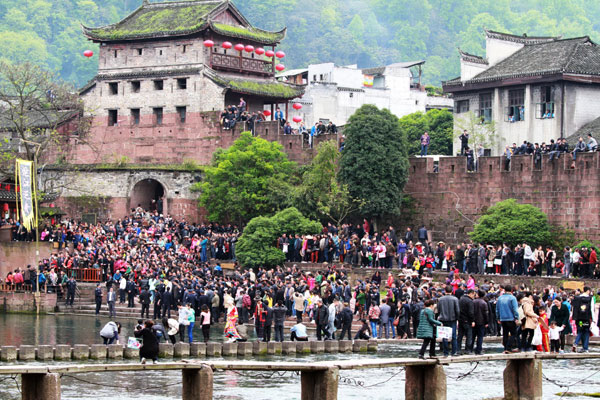Shops in scenic town back in business
 0 Comment(s)
0 Comment(s) Print
Print E-mail China Daily, April 16, 2013
E-mail China Daily, April 16, 2013
|
|
|
Shop owners block tourist boats in protest at a new government policy to charge an admission fee to the scenic town of Fenghuang in Hunan province. They fear the charge will deter tourists. Yi Mo / China News Service |
Thousands stage protest after entry charge introduced at ancient site
Most shop owners in a scenic town in Hunan province resumed business on Friday after a one-day strike to protest against an entry charge to the town was imposed by the county government.
They fear the admission charge will lead to a drop in tourists and that their businesses will be affected.
Cai Long, deputy head of the county government, told China Daily on Friday the county government will continue the controversial policy but make some adjustments as debate over the charge continues.
Liu Jianling, a clerk at a silver accessory shop in Fenghuang county, said most stores in the main shopping street had reopened by 3 pm. About 80 percent of shops in the street, including the one Liu works for, closed and many boats stopped picking up tourists on Thursday in opposition to the new charge, the 19-year-old said.
"Most shops reopened today but business was so slow that we only had one sale," she said. "Customer numbers were way down on a normal Friday when tourists start to flood in for the weekend."
She said no officials have visited traders in the old town to discuss the new policy.
Under the new policy, which took effect on Wednesday, tourists must pay an entrance fee of 148 yuan ($24) to visit the old town of Fenghuang, which includes admission to 10 scenic areas.
Previously, entry to the town was free but tourists had to buy tickets for each scenic spot they visited.
Liu said: "I don't like the new policy because a large number of visitors I meet here don't fancy doing too much sightseeing. They just want to spend some time to relax in this historical town. The admission charge for entering the old town will discourage many tourists from coming."
On Thursday, crowds gathered on roads and the riverbank to protest, while dozens of police with shields maintained order. Photos of the protest spread online.
Wang Hong, a lawyer in Changsha, capital of Hunan province, is also opposed to the new policy in her hometown.
"The old town is also a place where locals live. There are many private properties, so ownership (of the town) does not belong to the government - the streets there are public, too. Local residents have not empowered the government to enclose the town to sell entrance tickets.
"The admission fee will deter local residents from inviting friends and relatives who do not live in the old town from visiting their homes."
Wang said the government also failed to seek public opinion during the decision-making process.
However, Xiang Yang, who has worked for a local travel agency for more than 13 years, welcomed the new rule.
"In the past, I heard some tourists complain that they felt disappointed after visiting Fenghuang as there was not much to see here. Later, I realized that some illegal travel agencies charged tourists admission fees for scenic spots but simply skipped the spots that charge fees and took tourists to free ones," she said, adding that she believed the new rule will help combat such practices.
She also said the additional revenue will help motivate the government to invest in maintenance of the old town.
Cai stressed that the new rule is introduced to regulate the tourism market, and will help to protect the old town and benefit local business in the long run.
"We will not abandon the new policy but we will make some changes to the guidelines for implementing the rule," he said without elaborating.
Ren Zhenjun, director of the county's tourism administration, said it is not feasible for Fenghuang to copy the example of West Lake, a well-known tourist destination in Hangzhou, where admission is free, according to a report in the Xiaoxiang Morning Herald on Wednesday.
He said local residents in Hangzhou are the main visitors and leading consumers at West Lake, and the Hangzhou government owns a lot of property near the lake so it can guarantee sufficient revenue from rentals to cover maintenance costs, a different situation to that in Fenghuang.
He predicted a yearly increase of 10 percent in tourists visiting Fenghuang by the end of 2013, and said the number of visitors will rebound after July following a short-term decline.
"The business (of shops) may suffer in the beginning, but we should look forward."








Go to Forum >>0 Comment(s)